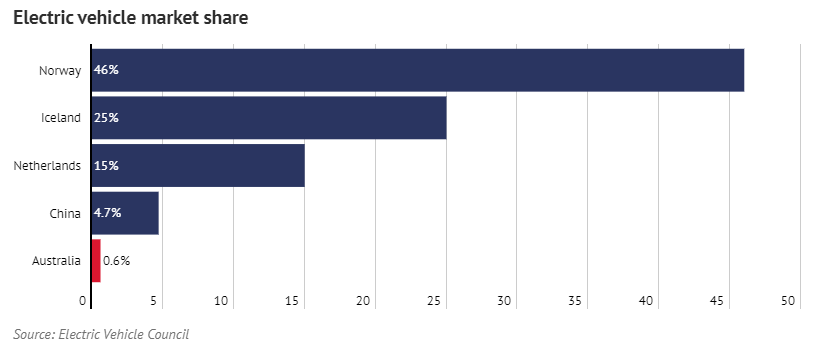Peer pressure is in part driving Australia’s sluggish uptake of electric vehicles, with new research showing Aussies are considering their family and friends’ opinions along with cost and car size.
Deakin University researcher James Davidson released his research on Monday showing “prevailing attitudes and social norms” were as important factors in driving consumer behaviour as tangible things like purchase price, operating costs, driving range, emissions and acceleration time.
“It’s not just the tangible attributes that underpin buying behaviour, but social norms, such as what your friends and family might think of your purchase and attitudes towards the vehicles,” Dr Davidson said.
“It doesn’t matter how good a vehicle is or how much it costs, if a potential buyer’s friends and family encourage it as the right choice that will make the real difference.”
While industry forecasts assume electric vehicles will take over the automobile market in coming decades, they accounted for just 0.6 per cent of vehicles sold in Australia last year with 6718 sold in 2019, up from 2216 in 2018.
The Bureau of Infrastructure, Transport and Regional Economics forecasts 60 per cent of new cars sales would be electric by 2046.
Energy and Emissions Reduction Minister Angus Taylor expects to release an electric vehicle strategy by the middle of the year which he said would “focus on practical actions to address barriers to EV uptake” and support “Australians who choose to adopt new technologies”.
“The strategy will ensure a planned and managed transition to this new vehicle technology,” he said.
The strategy will form part of the $3.5 billion Climate Solutions Package. It will also be part of the federal government’s Technology Investment Roadmap, expected to be released soon in draft form, to set investment priorities in emissions-reducing technologies.
A Morrison government source said they are not considering setting targets for vehicle sales as part of the strategy.
Last year the government announced it would replace its Comcar fleet of Holden Caprice sedans with a range of imported vehicles, including hybrid electric Toyota and BMW sedans, after General Motors ceased local manufacturing in 2017.
General Motors on Monday announced it would end the Holden brand, terminating around 600 local designs jobs, by the end of the year.
British Prime Minister Boris Johnson announced earlier this month a ban by 2035 on sales of new petrol, diesel and even hybrid cars.
A Senate Committee chaired by former independent Senator Tim Storer recommended the federal government set targets for commercial sales and government vehicles, coupled with stringent vehicle emissions standards and a public awareness campaign to drive sales of electric vehicles.
Electric Vehicle Council chief executive Behyad Jafari said the global transition to electric vehicles was inevitable and the federal government should “set a target for electric vehicle sales”.
“This would send a powerful signal to the global industry that Australia was a suitable place in which to invest and engage,” Mr Jafari said.
Dr Davidson said his research, which surveyed 500 Australians about electric vehicles, showed the keener the driver, the less likely they were to prefer electric vehicles.
“My data showed that if driving is someone’s preferred mode of transport – as is common in Australia – they are more price-sensitive and place a lower value on the attributes of electric vehicles than those who prefer other modes of transport.”
Extracted from The Sydney Morning Herald
